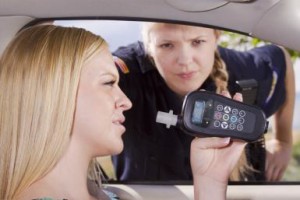You may assume that it is easy to spot a drunk driver; however, depending on the level of impairment, a drunk driver may not exhibit any overt signs that he or she is impaired. Therefore, how does a police officer decide when to make a DWI traffic stop? In some cases, the police may decide to stop a vehicle because some other law is being broken, for example when the driver is speeding. In other cases, a person might be pulled over purely on the suspicion that they are driving while impaired. In either situation, the police officer must have a “reasonable suspicion of criminal activity,” before making any traffic stop.
Reasonable Suspicion and the Drunk Driver
A police officer may not stop a suspected drunk driver simply on a hunch or feeling. The Fourth Amendment of the United States Constitution protects citizens from unlawful searches and seizures including unwarranted traffic stops. Therefore, a police officer must have a “reasonable, articulable suspicion of criminal activity” before making a traffic stop. Translated, this means that the officer must be able to explain what they observed about the way the vehicle was being driven that would cause a normal, reasonable police officer to suspect that the law was being broken.
Sometimes that reasonable suspicion can be very straightforward, as in cases where the car is driving at night without headlights or is going faster than the speed limit. It does not matter that their suspicion is not based on anything related to impaired driving so long as they can point to signs of some sort of illegal activity. In other cases, the officer is suspicious that the driver is impaired even though they are not actually breaking any other laws. Once again it is okay to stop that car so long as the police officer can articulate exactly what he saw about the way the motorist was driving that would support a reasonable suspicion that they were impaired.
Because the question of whether there was a good basis for pulling over a motorist can be a very complex and contested matter in a DWI case, it is important that you hire an experienced DWI attorney as soon as possible after a charge of driving while impaired. The attorney will investigate to determine if you can contest probable cause as part of your DWI defense.
The DWI Traffic Stop
If you are stopped by a police officer, the officer will ask you to produce your driver’s license and registration. The officer is observing you for signs of driving while impaired such as slurred speech, bloodshot eyes or the smell of alcohol. The officer may ask you questions such as where have you been and where are you going. You should never lie to an officer; however, you should politely decline to answer questions that may incriminate you based on your right to remain silent.
The officer may ask you to submit to a portable breath test (sometimes called an “alcosensor”). You are not required to take this test, and typically you should decline that breath test because the results are neither accurate nor can they be used against you in court. You might also be asked to perform some sobriety tests. Standardized field sobriety tests include the HGN Test, One-Leg Stand Test and Walk-and-Turn Test. It is important to note that you are under no legal obligation to take any of these tests. If the officer believes that you are a drunk driver, he will arrest you regardless of whether you take a field sobriety test. In most cases, it is in your best interest to decline these tests as they serve to provide additional evidence of probable cause.
If you or a loved one has been charged with DWI in North Carolina, contact our office immediately. Our experienced DWI attorneys will thoroughly investigate your case to prepare the best DWI defense possible for your charges.
Contact an Experienced Jacksonville DWI Attorney
“Attorneys Who Aggressively Protect Your Rights”
The Trevor J. Avery Law Firm, LLP is a full-service Jacksonville Criminal and Civil law firm that is committed to providing results-driven legal representation to businesses and individuals seeking an alternative to large-firm representation. We focus on getting you the results you want while offering you a cost-effective solution to your legal needs. We understand that we work for our clients; therefore; our attorneys communicate regularly with each client to ensure that the client knows what is going with the case.
When you have legal problems, you need an experienced legal professional in your corner. No matter the case, you should have an attorney working for you who knows the law and who has the experience to get results. We represent clients throughout Duplin County, Onslow County and the surrounding communities. Call our office at (910) 405-8459 or contact us online today for a free case evaluation.

